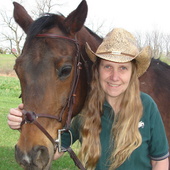Spring Grass May Be Harmful To Your Horses
Spring has arrived in Eastern Pennsylvania! The birds are singing, the flowers are beginning to bloom, trees are budding, the grass is growing, and the horses are anxious to begin munching on the tender, sweet, tasty green pastures.
Before turning the horses out on the pasture, there are a few things to keep in mind.
Horses are natural grazers. They require a diet that is high in fiber, which can be found in the mature, long-stemmed grasses. The young grasses are low in fiber and are high in soluble carbohydrates. The carbohydrates can upset the microbiotic balance in the horse's sensitive gut, causing the horse harm. Since horses have not eaten grass through the winter months, they may indulge if left on their own in the pasture. It is similar to letting a child loose in the candy store.
Large amounts of young grass in the horse's gut will disturb the natural bacteria. Bacterial toxin is released as large numbers of natural bacteria die off. This may cause laminitis, or "grass founder", particularly in horses with Cushing's disease, those with previous history of laminitis, or overweight horses/ponies.
There are ways to prevent this problem. Horse owners should limit the horses or keep them away from the young grasses, usually during the months of April and May. Introduce the horses to the pasture slowly. Begin with turning them out for 15-30 minutes to start, then gradually increasing the time. This will give the bacteria in the gut to adjust to the change. Supplement the horses with hay to include fiber in their diet.
Another type of grass to avoid in pastures is fescue. This is a variety of grass seed that is normally used for lawns. It is known to be disease resistant, drought tolerant, and resist insects and extreme temperatures. This variety of grass is hardy due to a fungus that lies within the species, which may be toxic to animals, especially to horses.






Comments(4)